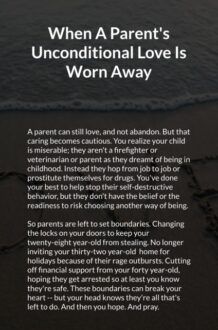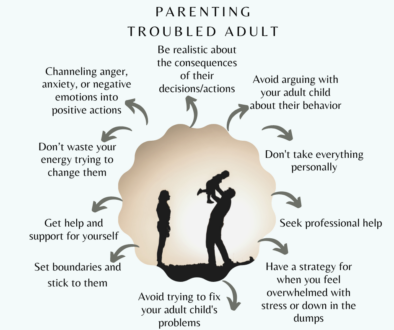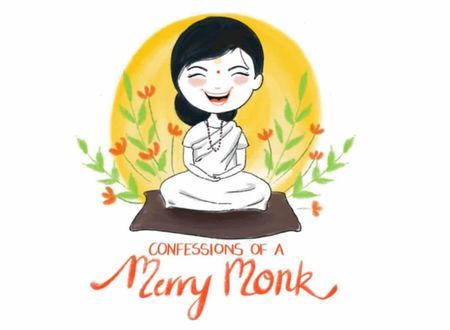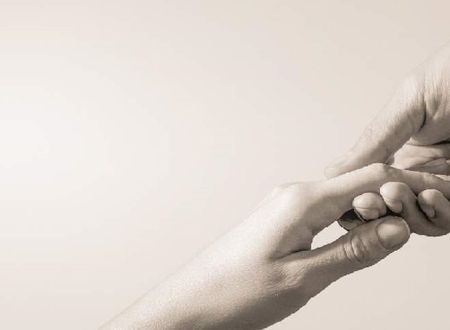It’s easy for parents to blame themselves when their children get into trouble. We want them to be better than we are and feel guilty when they don’t measure up. If we could do it over again, we would do things differently — or so we think. But what if our children were never meant to be perfect? What if they were meant to be different from us and make their own mistakes? What if their purpose in life isn’t to become just like us?
My last parenting article was on unconditional love. One question that kept coming back to me while writing was,” It’s easy to love a toddler or elementary schooler, but what about a parent dealing with a young teen adult or adult who is turning out to be a trouble to you and the society? How can you mentally, emotionally, and financially survive the onslaught of an adult child acting out? It is not only a tiger balancing act in terms of the emotional upheaval your family faces when your adult child acts out. It’s also a battle to keep your sanity intact while trying to be strong and desperately wanting things to get better.
A mom of a 20-year-old girl shared her pain with me. In her words,
“A negativity against her is building up and growing with every passing day. I cannot take more of her smoking, late nights, and irresponsibility toward her career… She has dropped halfway from her bachelor’s degree. She doesn’t seem willing to do even a bit of work, forget hard work, to build her life. The silence between us is helping me sail through my weak mental health. I feel unable to support others further, as I am helpless now. All these years, I have been a constant support. I think I can’t deal with it anymore. I really want to lead a guilt-free old age. My mind often blames me for bad parenting. It says you were not a wise parent, and that’s why your daughter is NOT doing well in life.”
It is challenging to handle when your grown-up adult child goes on self-destruction by stealing, drug addiction, and not taking responsibility for their life. You want to help them, but you must also protect yourself from the consequences of their bad decisions. The problem is that when our children are in crisis, and we don’t know how to help them, our emotions get caught up in their crisis, and we can lose perspective on what’s happening. We may feel helpless or frustrated by their behavior and responses. Still, sometimes we must step back from those emotions and try to see things as objectively as possible to make good decisions about how best to handle our child’s situation.
A friend of mine has been dealing with a troubled adult son with ADHD for the last 15 years ( since the time he was four years old). Lately, he has started displacing aggressive, irresponsible behavior. He has stopped studying, skips his medicines, plays video games the whole night, wakes up in the afternoon, and then goes back to playing video games. They tried doing the consequences parenting, but his anger is out of control and life-threatening. While all of his age group is busy applying for college admissions, he is playing video games.
I said to her, “At some point, you must be firm, even when he is angry. If needed, call 911 and let him face one consequence.” She cried, “Till now, I am the only one who has been by his side; he knows that. If I go very firm and take a drastic step like calling 911, he will have no hope. He anyways believes that everyone hates him. You know that he doesn’t have any friends. This one act and I can lose my son forever. I know for one thing, Nikunj, I would never let my son feel I am not by his side. I will do whatever it takes to take care of him. I said, “Sorry, but what happens when one day you are not there for him? We all die one day. He will be a fully grown middle age adult; he will be shocked and unprepared to realize that there is no one he can fall back on. He never learned to be on his own without his mother.”
When parents have a mix of successful and not-so-successful adult children, the heartache they suffer over one dysfunctional kid’s problems isn’t offset by positive feelings from the accomplishments of their other offspring, a new study finds.
“What this study really shows is that for parents, it’s very hard to see your children struggle,” said lead author Karen Fingerman, a professor in gerontology, developmental and family studies at Purdue University in West Lafayette, Ind.
Fingerman co-authored the study along with researchers at the University of Michigan and Pennsylvania State University. Although prior research has shown that parents report lower well-being when their grown children have problems and feel better emotionally when their kids are successful, Fingerman said no one had looked at how parents are affected when they have a mix of problematic and successful children. “We were kind of hoping for the opposite result, but it’s pretty consistent with the literature on negative emotions,” she said.
For the study, the researchers collected telephone survey results from 633 middle-aged parents in the Philadelphia area, who rated each of their grown children’s achievements in relationships, family life, education and career. The parents were asked whether each of their adult children had experienced a list of problems within the past two years, and to rate each child’s successes compared to other adults the same age. The parents were also asked about their own psychological well-being, and were questioned regarding the kind of relationship they had with their children.
The researchers considered two categories of problems: lifestyle and behavior problems that were due to the person’s own actions (“voluntary”), such as trouble with the law, drinking or drug problems, and financial difficulties; and physical and emotional problems, such as a disability or serious health issue (“involuntary”).
Most of the parents surveyed had two or more children, and roughly three-quarters of them reported having a mix of children experiencing problems and children experiencing successes.
The researchers found that parents who had more than one highly successful child reported better well-being. However, having even one problematic child had a negative impact on the parent’s mental health, even if their other children were successful. The findings were the same for both categories of problems.
Davey’s advice to parents: Try to step back and not be as involved in your grown children’s lives.
Source: One Troubled Adult Child, a Drag on Parent’s Mental Health
It is easier said than done.
 Source: Dr. Margaret Rutherford
Source: Dr. Margaret Rutherford
The good news is that there is hope! You can help your child recover from their past and begin the journey towards real healing. You must not give up on them or yourself because this is a journey for your child and you.
I find two elements that can help get positive results:
- Unconditional Love – Unconditional love is the most powerful force in the universe. It can heal, it can destroy, and it can motivate us to be better human beings. Unconditional love doesn’t mean that we accept unacceptable behavior. We don’t have to tolerate abuse or disrespect. We don’t have to look the other way when someone makes bad choices or hurts others. We can still set boundaries and enforce consequences when our children make poor decisions. But we do so from a place of compassion, not judgment or fear. Unconditional love gives us the courage to be vulnerable with our children and lets them know that no matter what happens in their lives, we will always be there for them without fail.
- Detachment – Letting go of the outcome so you don’t feel responsible for your adult child’s choices or actions. This allows you to focus on yourself and what you need to do instead of worrying about whether or not your adult child will choose recovery.
Detachment is giving the other person time and space so they may learn to be more responsible. It is a reminder that you can’t take care of the other person without taking care of yourself first. It is the understanding that you too deserve to do things that make you happy. You’ve as much right to life as anyone else – When Care Destroys Love
The tiger balancing act is a metaphor that describes the plight of a parent trying to balance their child’s needs with their own needs as an adult. When you practice detachment and unconditional love as a parent, I call it a Tiger Balancing Act.
As a parent, it’s important for you to maintain a healthy perspective on your child’s situation. You are not responsible for their choices, but you are responsible for your own. Here are some tips on how to do that:
- Be responsible for yourself first. You cannot help someone unless you take care of yourself physically and mentally/emotionally first. If you are suffering from stress, anxiety, or depression, it will be difficult for you to offer support or make good decisions on behalf of your loved one. Seek professional help if necessary; look for a licensed therapist who specializes in addiction treatment or mental health issues such as anxiety disorders and depression; find a support group where other parents have been through similar situations; reach out to other family members who can lend an ear when needed; spend time with friends who won’t judge or criticize you for the situation.
- Take your time, and don’t pressure yourself to make quick decisions at this difficult time. Allow yourself time to process what is happening, and practice patience and compassion for yourself – and your loved one, if it feels possible (with some time). Accept that things may not change overnight and that this is not necessarily a reflection of your parenting skills or abilities.
- Don’t be afraid to say no! Your child may have been used to getting away with things all their life because they were a child. Now that they are an adult and living in your home, you need to set some rules about what behavior is acceptable and what isn’t! If they don’t like it, then tell them that’s too bad because if they want to live under your roof, then they have to follow your rules!
- Stay connected with other supportive people in your life, such as family members, friends, and maybe an understanding coworker or boss – so that you know you have some people who will be there for you, listen to you, and provide empathy, encouragement, and advice.
- Practice Faith. To help our adult children make healthy decisions, we need to practice faith in their ability to make good choices for themselves. This does not mean we should ignore the facts or turn a blind eye to their behavior or circumstances. It means we can trust that God has placed within each person the ability to be self-sufficient and make good decisions for themselves.
- Don’t enable them by giving them money when they ask for it! No matter how guilty you feel about not giving your adult child money when they ask for it, you need to realize that this enables them and their bad behavior! If they want money, they should earn a job like everyone else.

In os.me community, some wonderful, brave parents have shared their stories, asked questions, and shared solutions that worked for them, and I am listing them below.
- Is it the right way? Suppose you have already explored all other options to deal with the unhealthy ways of living of your 21 years old daughter. Now you find that she is immune to every counseling etc. So you keep quiet and live together under the same roof as a silent spectator. Occasional advice via occasional WhatsApp messages and registering your non-approval of her lifestyle is your way of communication now. This keeps confrontations away.
- How can a mother practice detachment when deeply affected by her child’s grief? A mother is concerned about her child’s well-being more than anything in the world; in that case, seeing them in trouble is enough to destroy her peace . How can she learn to handle and accept that she cannot control everything in their lives
- How do you prioritize parenting and work? Since I got up this Saturday morning, I have constantly been doing household chores and looking after the children. Cooking and feeding my children gave me a lot of happiness, but at the end of the day (late at night), I realized that I had not managed to do any of the online courses related to my office work. I want to upskill so that my work prospects improve. I know that parenting is very important for me, but so is earning money so that I can support our family. How do you choose between the two? Both seem to be equally important.
- Detached Parenting – Very recently, I read a question in the community section where a mother is worried about how to feel detached concerning her child. This made me reflect upon the parenting skills I am using and is it helping my daughter?
- Have I Been a Bad Parent? Where did I go wrong? How do I persuade my kids that I tried everything, that I didn’t mean to be a bad parent, that they were my priority, and that, I only meant their welfare? Often I meet parents who sacrificed their desires for decades only to feel later that they didn’t do a good job at bringing up their kids, or that they went wrong somewhere, or that they were terrible parents (as mostly their kids had them believe). I look at the emotional turmoil they go through because their children have convinced them with their gestures, impressions, and words that they — the parents — couldn’t get their act together.
As parents, to survive this balancing act, we need to learn how to let go of our expectations about how life should turn out for our children and grandchildren so that we are not disappointed when life doesn’t unfold according to plan. If we don’t let go of these expectations, we cannot detach ourselves emotionally from whatever goes on in their lives because we will feel like we have failed them. We need to let go of the outcome of our children’s lives and accept them for who they are, not as we would like them to be.
=======================================================================
How do you like the idea of inviting a psychologist to answer difficult life situations with children in os.me Q&A? Please share your thoughts. Depending on the responses, I would start working on the idea. It would be great if you could also share your questions in the comments below.









Comments & Discussion
16 COMMENTS
Please login to read members' comments and participate in the discussion.